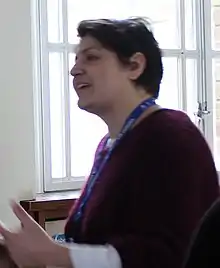Sonia Contera
Sonia Antoranz Contera (born 1970) is a Spanish physicist. She serves as Professor of Biological Physics at the University of Oxford,[1] a Senior Fellow at the Oxford Martin School,[2] and a Research Fellow at Green Templeton College.[3]
Sonia Contera | |
|---|---|
 Contera speaking in 2019 | |
| Born | Sonia Antoranz Contera 1970 Madrid |
| Nationality | Spain |
| Alma mater | Autonomous University of Madrid Osaka University |
| Occupation | Physicist |
| Employer | University of Oxford |
| Title | Professor of Biological Physics |
Early life and education
Sonia Antoranz Contera, born 1970, is from Madrid, Spain.[4] She studied for her Licenciatura in Physics at the Autonomous University of Madrid.[5] She went on to study in Moscow, Prague and Beijing.[6] She received her PhD from Osaka University in 2000, where her supervisor was Hiroshi Iwasaki.[7][5]
Having traveled extensively during her education, Contera speaks Spanish, English, Chinese, Czech, Russian, Danish, Japanese and German.[4]
Research and career
Contera's research uses physics and nanotechnology to understand biological problems.[8][9] She has a special interest in the role of mechanics in biology and designs nanomaterials that mimic biological functions for biomedical applications such as drug delivery[1] and tissue engineering.[10] In 2003, she began working at Oxford.[4] Contera was Co-Director of the Oxford Martin Programme on Nanotechnology for Medicine from 2008 to 2013.[11][12] In 2014–2016, she was a Member of the World Economic Forum Global Agenda Council on Nanotechnology.[13][14] In 2017, Contera was appointed Chair of the Scanning Probe Microscopy Section of the Royal Microscopical Society.[15]
Contera's book Nano Comes to Life was published December 2019.[16][17]
References
- "Sonia Contera". World Economic Forum. Retrieved 2019-05-23.
- "Fellows". Oxford Martin School. Retrieved 2019-05-23.
- College, Green Templeton. "Dr Sonia Antoranz Contera". Green Templeton College. Retrieved 2019-05-23.
- Oppenheimer, Walter (26 December 2012). "La medicina del futuro". El País (in Spanish). Retrieved 24 May 2019.
- "ORCID". orcid.org. Retrieved 2019-05-23.
- Oppenheimer, Walter (2012-12-26). "La medicina del futuro". El País (in Spanish). ISSN 1134-6582. Retrieved 2019-05-23.
- "Sonia Antoranz Contera | University of Oxford Department of Physics". www2.physics.ox.ac.uk. Retrieved 2019-05-23.
- "Sonia Contera - EPSRC website". epsrc.ukri.org. Retrieved 2019-05-23.
- Levine, Alaina G. (November 14, 2014). "Biosystems nanotechnology: Big opportunities in the science of the small". Science. AAAS. Retrieved 2019-05-25.
- Luna, Mónica (August 22, 2011). "Nano-ingeniería de tejidos para medicina regenerativa". El Mundo (in Spanish). Retrieved 2019-05-25.
- "Professor Sonia Contera | People". Oxford Martin School. Retrieved 2019-05-23.
- Rius, Mayte (2016-05-07). "¿Somos como dicen los estereotipos?". La Vanguardia. Retrieved 2019-05-25.
- "Global Agenda Councils - World Economic Forum". widgets.weforum.org. Retrieved 2019-05-23.
- Paniagua, Esther (2016-07-19). "Sonia es profesora en Oxford: "Eliminaría los exámenes en primaria"". El Mundo (in Spanish). Retrieved 2019-05-25.
- "Scanning Probe Microscopy". www.rms.org.uk. Retrieved 2019-05-24.
- "Nano Comes to Life by Sonia Contera | Waterstones". www.waterstones.com. Retrieved 2019-05-23.
- CONTERA, SONIA. (2019). NANO COMES TO LIFE : how nanotechnology is transforming medicine and the future of biology. [S.l.]: PRINCETON UNIV PRESS. ISBN 978-0691168807. OCLC 1099683369.
External links
- "How can nanotechnology address medical problems?", Oxford Martin School, September 20, 2012
- "How can we capture the possibilities but avoid the pitfalls of nanotechnology?" panel, Nesta UK, March 26, 2013